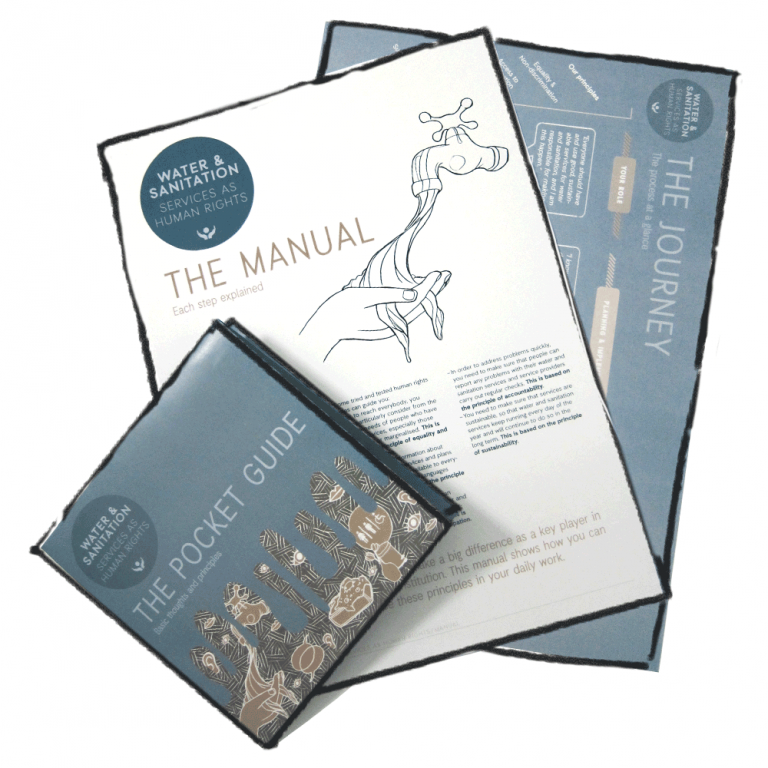
The Making Rights Real approach is based on the conviction that without local government, services for all will not be possible, and that human rights can empower local government officials to solve many systemic challenges they face themselves.
The approach can be used in all kinds of WASH sector programmes and in combination with your own methods or approaches. It consists of materials that introduce human rights concepts to local government officials and a suggested process of engaging them.
Combined, the materials and process facilitate constructive and solution focused engagement of local government officials about challenges they face in their daily work – and encourages them to do better, using human rights. Users of the approach are encouraged to adapt the Making Rights Real process to their particular context.
The Making Rights Real materials are:
– The Pocket Guide – basic thoughts and principles
– The Manual – applying principles in practice
– The Journey – the process at a glance
The materials emphasise the five human rights principles of non-discrimination and equality, access to information and transparency, participation, accountability and sustainability. These serve to guide professionals working in local government to work towards realisation of services for all in a targeted manner, even with limited resources and within their area of responsibility.
Download the Making Rights Real materials below.
The process to apply the Making Rights Real materials consists of six suggested steps for engaging local government officials. We encourage you to use these steps as inspiration and to adapt this process of engagement to the context in which you use the Making Rights Real approach. The key is to aim for a collaborative and constructive engagement on existing challenges – and how they might be overcome, using the guidance contained in the Making Rights Real materials.

Among your contacts, who is open to talking about problems? Who are the would be heroes who could be heroes? Identify the individuals in local government who you think are open to new ideas. You can use the persona document (> see support materials below) to identify the people you want to engage with.


What small changes could ‘your’ local government officials make to solve some of their challenges? Introduce the Making Rights Real materials (> download below) to ‘your’ local government officials and have a conversation how the principles and concepts explained therein relate to their work. Leave the materials behind and agree a time when you will meet again.

After some time for reflection, what do ‘your’ local government officials think about the principles and concepts explained in the Making Rights Real materials?
You can use the midline questionnaire (> see support materials below) to structure this conversation.

Have ‘your’ local government officials identified any action they can take to address the challenges they face, using the principles and concepts explained in the Making Rights Real materials? Talk about concrete actions they will take and any support you may be able to provide.

Have ‘your’ local government officials become super heroes for water and sanitation services? What action have they taken? What have you learned about using human rights in practice?
You can use the endline questionnaire (> see support materials below) to structure the conversation.
Making Rights Real materials (3-piece set + instructions for printing, etc.)
The support materials are currently only available in English
Carrard, N., et.al.
This paper describes the development and features of the Making Rights Real approach, shares initial results from its implementation, and reflects on the potential for the approach to catalyse transformational change towards local realisation of the human rights to water and sanitation. It was published in Water – Special Issue Human Rights to Water and Sanitation.
Gosling, L., Abraham, T., Fuller, R. & Latorre, C.
An article on the growing experience with use of specially developed guidance, including Making Rights Real, to overcome local misunderstandings over what the human rights to water and sanitation entail.
SDG progress by making water rights real in service delivery
Pati, B. & Neumeyer, H.
This article describes the experiences and results from using Making Rights Real in three districts in Odisha, India.
http://wedc.lboro.ac.uk/resources/conference/41/Pati-2928.pdf
Neumeyer, H. & Roaf, V.
This paper explains the motivation behind creating Making Righths Real and the process of developing the Making Righs Real approach.
Keatman, T. et.al.
The Making Rights Real consortium undertook research to better understand the perceptions of local government officials and others on how to practically use the human rights framework. The paper provides an overview of the findings.
https://rwsnforum7.files.wordpress.com/2016/11/full_paper_0191_submitter_0267_keatman_tracey.pdf
The Making Rights Real materials are currently available in eight languages:
English | Afan Oromo | Bangla | French | Hindi | Oriya | Spanish | Portuguese.
The support materials (persona document and questionnaires) are currently only available in English.
Get in touch if you would like to translate the Making Rights Real materials or support materials into another language.
It is best if you let a professional printer print the Making Rights Real materials. Refer to the Instructions for use for details on the type of paper to use and how to fold the materials. In the future, we want to make the Making Rights Real materials available in a format that can be printed out on office printers.
You are free to use the Making Rights Real materials for non-commercial purposes in any way you like. The six-step process is just a suggestion.
In creating the Making Rights Real materials, we have tried to find the right balance between presenting human rights in a way that is relevant and useful for local government, while also presenting legally correct information. This is why we ask you not to make changes to the materials themselves by yourself. If you have suggestions for improvements, please tell us! We want to improve the materials over time, and your input will be helpful for that.
Making Rights Real has been developed by experts on human rights, WASH and communication from a consortium of organisations: WASH United, WaterAid, the Institute for Sustainable Futures (University of Technology Sydney), the Rural Water Supply Network (RWSN), End Water Poverty (EWP), Unicef and Simavi. Together, we support implementation of Making Rights Real and continue to develop the approach on the basis of experiences with implementation.
Everyone is free to use, reproduce and share the Making Rights Real materials for non-commercial purposes. The materials are subject to the Creative Commons Attribution-Non-Commercial-Share-Alike 4.0 International Public License (https://creativecommons.org/licenses/by-nc-sa/4.0/legalcode).
As a consortium, we are not able to provide funding to organisations that want to use Making Rights Real. If you have questions on how you can use Making Rights Real, please get in touch with us!
No. The Making Rights Real approach can be used without special training. You can refer to the six-step process for a suggested way of using Making Rights Real, or you can find your own way of integrating it into WASH programming. If you have questions on how to use Making Rights Real, please get in touch and we will do all we can to help. In the future, we want to make support available that is easily accessible for WASH practitioners, such as webinars.
It depends on the context! Some organisations have used Making Rights Real and achieved results after only six months. In other cases this will take longer. How long the process takes will depend on factors such as the challenges you want to address, the willingness and ability of local government officials to affect change over time, and many more. To help you monitor whether you are achieving change, you can use the questionnaires as described in the six-step process.
We suggest you build monitoring and evaluation into your process of working with Making Rights Real. You can use the questionnaires in the support materials to carry out baseline, midline and endline surveys, as described in the six-step process. Depending on your programme, you may also want to use other methods to monitor success. If you have suggestions that you think could help others, we would love to hear from you!
Publisher: WASH United gGmbH
Fuerbringerstrasse 7 | 10961 Berlin | Germany
Telephone: +49 (0)30 555 768 060
Email: info@wash-united.org